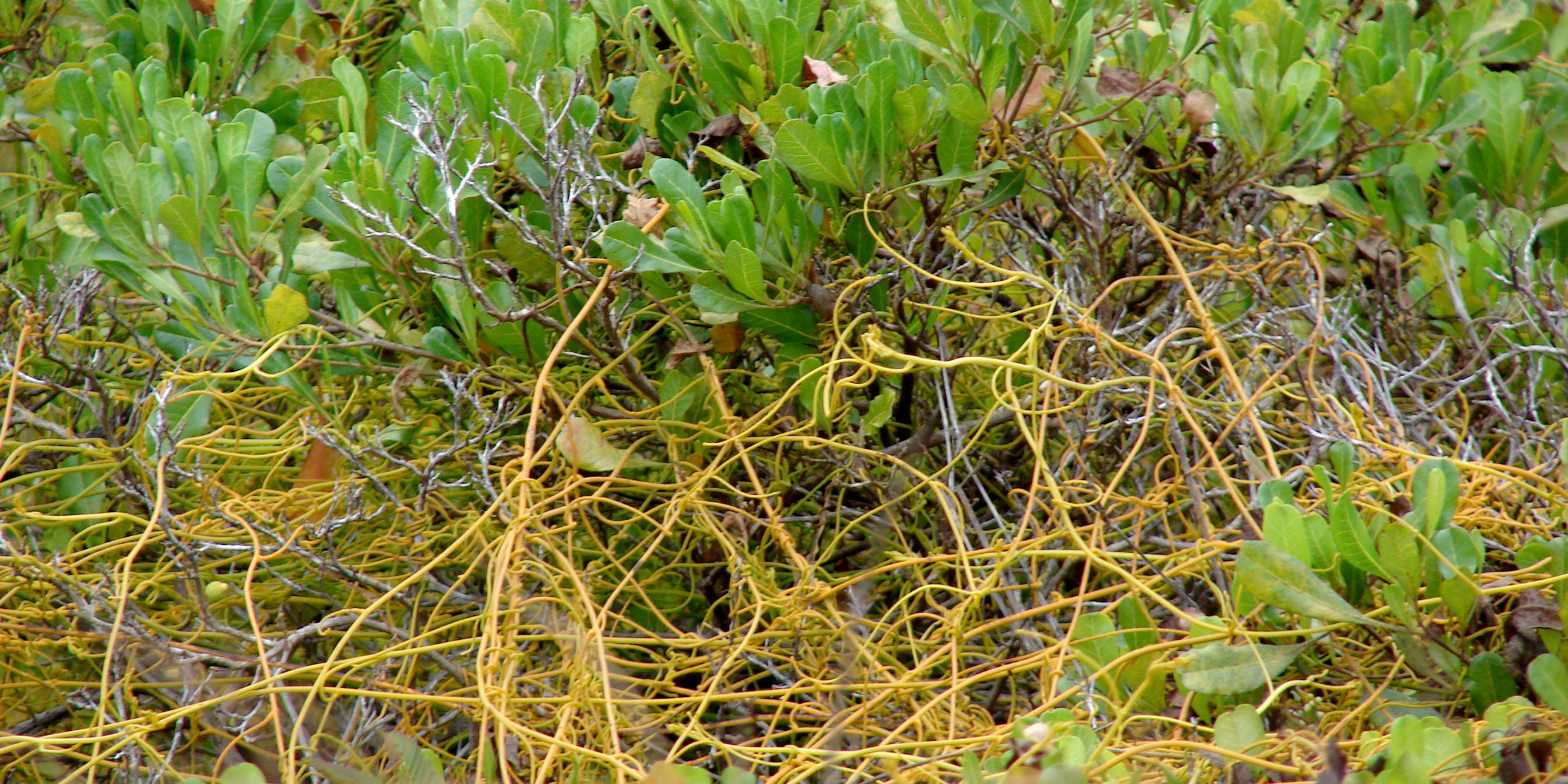Originally published 15 February 2000
EXUMA, BAHAMAS — OK, so it’s Valentine’s Week. I’ve just spent a week pulling love vine out of the garden and I’m not feeling very romantic.
Maybe “garden” is too grand a word for this scruffy plot of rock, sand, native shrubs, and stunted trees. My wife has been struggling valiantly to get other things to grow — oleander, hibiscus, bougainvillea, that sort of thing, all moonlight and blossoms — with love vine as her constant enemy. She’s not feeling very romantic either.
Love vine, sometimes called dodder, is a rampant parasite on this island and throughout the Caribbean. With hardly any chlorophyll of its own, it can’t make nutrients from sunlight. It must take sustenance from other more self-reliant plants. To this end it sends out tendrils — thick orange strings — ten, twenty, thirty feet across the sand. When it finds a healthy plant it latches on and turns itself into a voracious tangled mass, twinning on every leaf and branch, sinking its insidious little papillae into the host and sucking the lifeblood dry.
The plant starts out as a seed in the ground and a semblance of earthy respectability, but as soon as it finds a host to feed on it abandons all connection to the soil. I’ve seen trees and shrubs so densely matted over with love vine that its impossible to tell what’s underneath.
Why is it called “love vine?” I decided to consult the two “bush doctors” on the island.
Christine Rolle said: “See how the love vine winds up the tree and attaches itself to the branches. Love your partner as the love vine loves the tree and you’ll never drift apart.”
Joe Romer has a more sardonic view: “The more it grows, the more it wants to grow. The more you pull it down, the more it come.” There’s a story behind his remark, but Joe would have to tell it.
The biologist David Campbell, who has written the book on Bahamian natural history, says of love vine: “Bahamians and people of the Greater Antilles repute it to be an aphrodisiac, a claim that is so pervasive that one hesitates to discard it as mere untutored belief.”
Christine and Joe concur.
Christine is inclined toward euphemism: “The love vine is used for what you call the weak spine. Some people say that the man they love has a weak spine, so they make sure to dose their man with this potion.”
Joe adds love vine to his famous herbal brew that is reputed to grow hair on your head, smooth your skin, and put fire in your blood. “Like egg in the cake,” he says. “You can’t make a cake without the egg.” When he whips up his eggy love vine decoction, it looks like “sperm,” he says. And that’s what it helps build up, he claims.
One doesn’t quite know what to make of this island lore. Does the love vine take its name from its reputed aphrodisiacal properties, or is it the other way around? In the interests of science, I decided to try the stuff myself. I brewed up a tea and quaffed it down.
“Every plant has a remedy,” they say in the islands. Aloe for joint pains. Banana leaf for fever. Jumbey as a sedative. Pond bush for prickly heat. All this lore is dying out. Christine and Joe may be the last bush doctors this island will ever see. There are government clinics now, with MDs and modern pharmacies. Why take prickly pear for headache when you can get aspirin at the market?
Many bush cures may “work” through the power of suggestion. And it is now realized just how poisonous some plants can be. Many a sick person in the islands may have been made worse, to say the least, by being fed a strong bush tea.
Still, pharmaceutical and dietary supplement companies are busily prospecting for bush medicines that do in fact contain an active ingredient that effects the reputed cure. Nature has whipped up many more potentially useful chemical compounds than can be expeditiously contrived in the laboratory. Drugs and dietary supplements are big, big business, and it’s always possible that some local remedy might be a gold mine.
This raises the question of whether and how indigenous peoples should be compensated for bush lore when the bucks start rolling in. Is “bush medicine” protected by intellectual property rights? Do pharmaceutical and dietary supplement companies have an ethical obligation to recognize these rights? Who gets the compensation? How is it distributed?
These are important matters for the bioprospectors, but right now my scientific experiment has to do with love vine tea. Is that a stirring in the blood I feel? A tickle of desire? Yes? No? Yes. Yes!
My wife has just come in from pulling love vine. Hey, it’s Valentine’s Week. I’ll see ya later.



